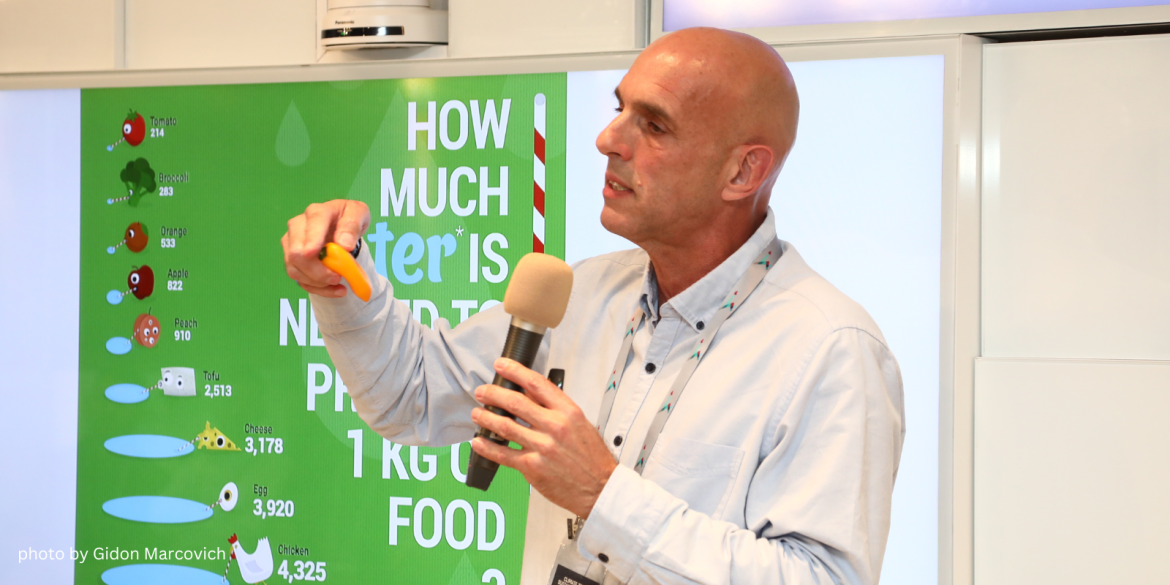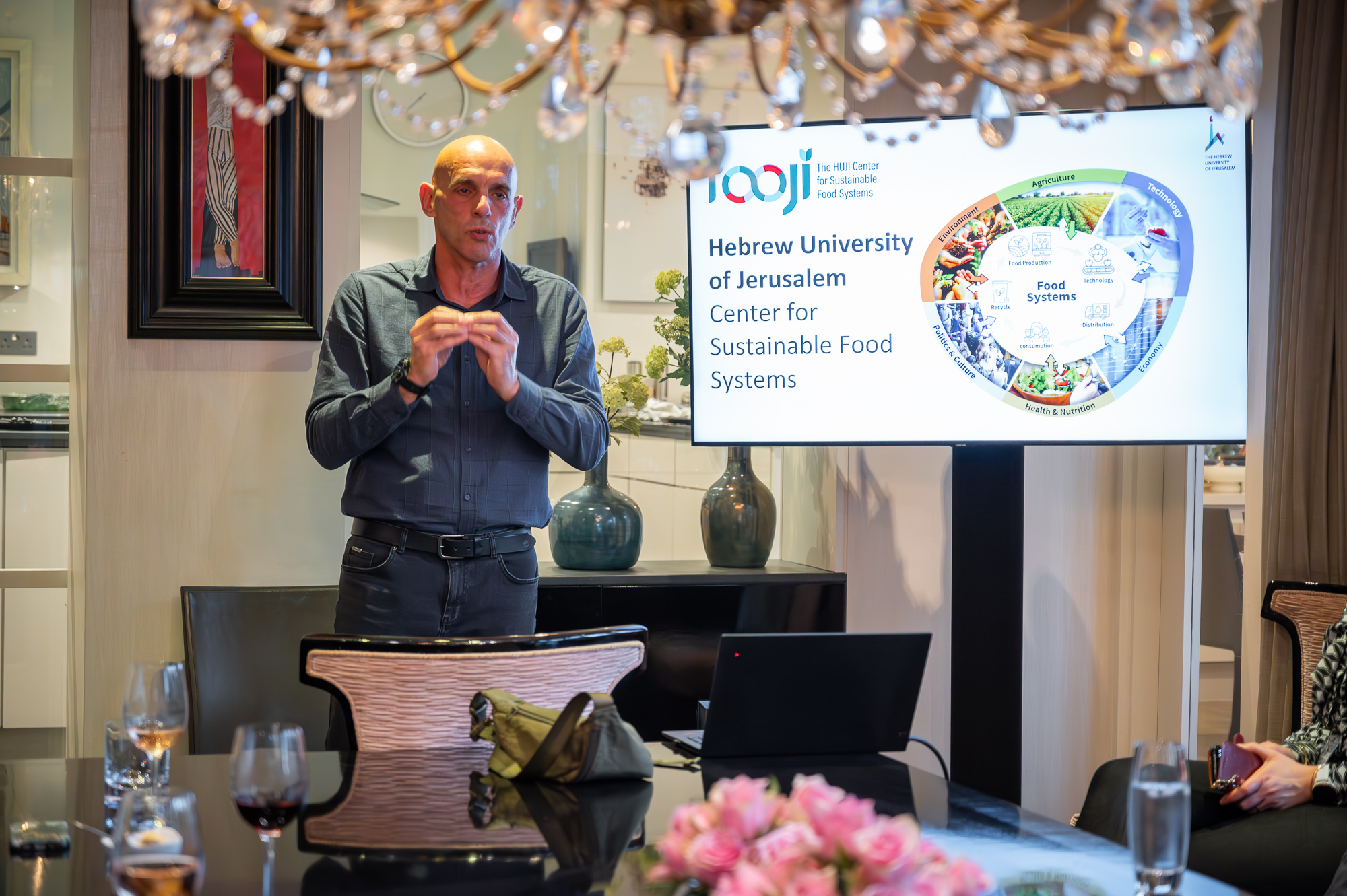
Water Reuse and Sustainable Food Systems: A Conversation with Professor Benny Chefetz.
Professor Benny Chefetz is a fascinating individual. He is the Director of The Hebrew University Center for Sustainable Food System, where he is engaged in examining food systems from the farm to the table, from agriculture to cultured meat, from agriculture through registration and transfers to industry.
His expertise and international specialisation lie in water reuse, and his primary research focus is on irrigation using recycled water and tradeable wastewater – water reuse. He is a global leader in the areas of irrigation with low-quality water, studying the results, understanding their effects on the agricultural environment and on us as humans, how irrigation using recycled water affects our food, how plants cope, and the impact of pollution.
He is an environmental chemist who delves into soil research, what happens to soil, land, and plants in the absence of water. In Israel, there is a shortage of water, so they irrigate with recycled water which is collected in many water reservoirs across the country. The question is whether it’s good or bad, what it does to the soil and to the plants that grow on it, and what it means for us as consumers.
To London, he came for a very short visit to meet with the UK based leading Israeli Hebrew University alumni as part of the new initiative of the alumni community, established and managed by another graduate, Merav Shany. At the gathering held at the residence of Alan Jacobs, Chair of the British Friends of the Hebrew University, Professor Chefetz spoke about global trends in the food industry, the future of food and future food, about CO2 emissions arising from the beef industry, about the implications of the expected rise in average global temperature and about his holistic vision that aims to connect people from the fields of social sciences, nutrition, health, business, regulation and technology for the development of healthy food, perhaps even better than the natural, existing, and polluting product.

Professor Benny Chefetz speaks at a Hebrew University Alumni gathering in London.
Photo by Romi Nicole Schneider
Prior to his arrival, he took a short break to speak with us about his work, his concerns, and why being vegetarian is the answer in the long run: “The Hebrew University is a leader in technology and cultured meat. Its unique approach emphasises a holistic view of food systems and the connection between disciplines. My mission is to connect people from social sciences, nutrition, health, business, and regulation with technology experts to develop technology that will produce food for the end consumer that is not only healthy but even better than natural products” says prof Chefetz. He believes that if the product is too expensive, people won’t but it; if the technology is good but the taste is not, no one will buy it; If the nutrition will be low, no one will consume it. “Therefore, from the beginning, we bring together researchers from all fields to create a good product that is environmentally sustainable”.
Israel is one of the leading countries globally in developing sustainable food systems and investments in the food industry and cultured meat. Israel and the Hebrew University are dominant players in the alternative protein market. For example, in the field of food, where the University is involved, 40% of the investments in food tech start-ups come from the Hebrew University, and Israel was second only to the United States. In contrast, in 2021, the UK invested $37 million in cultured meat, while Israel invested $508 million.
Professor Chefetz highlights Israel’s advantage in dealing with prolonged challenges compared to other countries in the world that have been grappling with climate change, the desertification crisis, and population explosions in recent years. “In the UK, the recent winters and hot summers have encountered Britain with significant problems. There is a lack of natural flowing water in rivers, and agriculture is suffering. The UK relies on rainfall, whereas Israel does not depend on rainfall; instead, the majority of Israel’s water is recycled. Therefore, when there is a climate change, British agriculture is affected because they don’t know how to irrigate or where to get water from”. he says and adds: “The knowledge that has accumulated in Israel regarding water management can help European countries. They can learn from Israel’s practices in water storage, recycled water systems, and water transport and apply them in the appropriate environment”.
“In areas where there is plenty of water for the population, there will usually be very little agriculture, but 80% of the world’s water is used for agriculture. If water is saved in agriculture, more can be given to cities and people. Therefore, the importance of water use efficiency in agriculture is crucial, and using recycled water is better for people than regular water. In a world of global trade, one country’s problems or challenges directly affects all countries that import local products, and Israel’s production is not affected because they have tools and knowledge to cope.
So how is water connected to cultivated meat?
“What we will eat in the future is related to why and how we irrigate. If the water is not clean, our food is likely not to be clean. If there is not enough water, we need to understand what to do. What are the global food trades? The central message is that we cannot continue to do what we have done until today because otherwise, we will not be able to feed the world and ourselves. There is immense global importance not only for water but also for food quality and food security, beyond the inability to import food. Nutrition-related problems lead to migration. There are stories that are connected to food even if we don’t realise it: war affects food, climate change affects food, CO2 emissions affect food. European countries are benefiting from Israeli technologies, and there is a lot of collaboration with The Israel Innovation Authority and academia. At our Center for Sustainable Food System, we are dealing with a global problem, not just a national one.”
